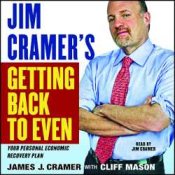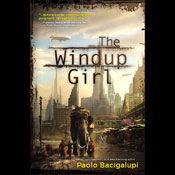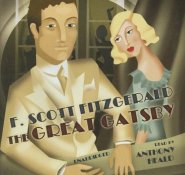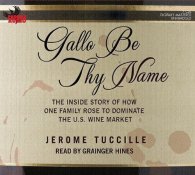November 2009
AUDIO BOOK REVIEWS
by Jonathan Lowe
 Jim Cramer is host of Mad Money,
and a columnist for TheStreet.com. He
was taken to task by Jon Stewart for not
adequately predicting the crash of Oct.
2008, and here defends himself in GETTING
BACK TO EVEN, which he wrote with Cliff
Mason, another Mad Money writer. Actually,
he says that he did tell his audience
to sell stocks prior to the fall (just
not far enough before—only days
instead of months). In this audiobook,
which Cramer also narrates, are his stock
picks for recovery, as well as his strategy
for reversing one's own losses into gains
(which he himself claims to have done).
The subtitle is Your Personal Economic
Recovery Plan, and while he might
sound like a male version of Susie Ormond,
with a driving, urgent delivery, his focus
is more on investing and understanding
how the market operates than in personal
expenditures and lifestyle. So while his
every sentence carries an exclamation
point, as does Ormond, he's not talking
to you like you're a daughter or son in
need of council, but rather an equal who
needs to know all the shenanigans utilized
by Wall Street insiders to keep you from
playing the market like they do. Do you
buy-and-hold? No, no, no, says Cramer,
that's such a way to lose in a downturn.
His motto is buy-and-homework. The more
you know the better your chances. Knowledge
is power, as any self employed person
instinctively learns. The corporate CEOs
who reap millions at your expense know
that the less information you have the
bigger their bonuses. If they can keep
you a sheep, you can be fleeced again
and again. Which, of course, is what we
say about television. (Simon & Schuster
Audio; 6 hours abridged)
Jim Cramer is host of Mad Money,
and a columnist for TheStreet.com. He
was taken to task by Jon Stewart for not
adequately predicting the crash of Oct.
2008, and here defends himself in GETTING
BACK TO EVEN, which he wrote with Cliff
Mason, another Mad Money writer. Actually,
he says that he did tell his audience
to sell stocks prior to the fall (just
not far enough before—only days
instead of months). In this audiobook,
which Cramer also narrates, are his stock
picks for recovery, as well as his strategy
for reversing one's own losses into gains
(which he himself claims to have done).
The subtitle is Your Personal Economic
Recovery Plan, and while he might
sound like a male version of Susie Ormond,
with a driving, urgent delivery, his focus
is more on investing and understanding
how the market operates than in personal
expenditures and lifestyle. So while his
every sentence carries an exclamation
point, as does Ormond, he's not talking
to you like you're a daughter or son in
need of council, but rather an equal who
needs to know all the shenanigans utilized
by Wall Street insiders to keep you from
playing the market like they do. Do you
buy-and-hold? No, no, no, says Cramer,
that's such a way to lose in a downturn.
His motto is buy-and-homework. The more
you know the better your chances. Knowledge
is power, as any self employed person
instinctively learns. The corporate CEOs
who reap millions at your expense know
that the less information you have the
bigger their bonuses. If they can keep
you a sheep, you can be fleeced again
and again. Which, of course, is what we
say about television. (Simon & Schuster
Audio; 6 hours abridged) |
 Paolo Bacigalupi has, up to now, been
primarily known as an SF short story writer,
praised for his original and confrontational
vision. With his new novel THE WINDUP
GIRL he has vaulted himself onto the center
stage, alongside science fiction's longstanding
icons. Here is a novel postulating an
unflinchingly corrupt and degradative
near-future society in southeast Asia,
where powerful corporations vie for control
over rice yields, wielding bioengineered
viruses as tools of profit. Environmental
disasters, terrorism, and the unrestrained
cruelty of prejudice backdrop the story
of an engineered "new human" girl bred
for resistance to the newly perpetrated
plagues, and to serve her masters in all
demeaning ways possible. The reader, and
particularly the listener to Jonathan
Davis as narrator, comes to feel every
bitter debasement and shame that unfeeling
men can inflict on a sensitive, innocent
creature, albeit one designed to submit
to it. Davis is particularly good at infusing
the manufactured (yet very human) girl
with a pathos that is heartbreaking, as
when an admirer mistakes her for a regular
human, then recoils in revulsion when
he discovers from her jerky "tick tock"
movements that she is "only a toy, a filthy
animal worthy only of mulching." The windup
girl soon curls into a ball, wishing to
be thrown away with the trash, after her
rape and humiliation by heartless murderers,
and we are made to feel her exquisite
pain, and to crave for her eventual resistance.
In a way, the novel is reminiscent of
the movie A.I. (the Pinocchio story)
in which the little manufactured boy seeks
to become a real boy. Brilliant and literate,
it is also a fascinating tale, well told,
and a cautionary extrapolation of how
evolution can drag humanity backward if
we are unwilling to seek higher ideals.
Not to be missed. (Audible)
Paolo Bacigalupi has, up to now, been
primarily known as an SF short story writer,
praised for his original and confrontational
vision. With his new novel THE WINDUP
GIRL he has vaulted himself onto the center
stage, alongside science fiction's longstanding
icons. Here is a novel postulating an
unflinchingly corrupt and degradative
near-future society in southeast Asia,
where powerful corporations vie for control
over rice yields, wielding bioengineered
viruses as tools of profit. Environmental
disasters, terrorism, and the unrestrained
cruelty of prejudice backdrop the story
of an engineered "new human" girl bred
for resistance to the newly perpetrated
plagues, and to serve her masters in all
demeaning ways possible. The reader, and
particularly the listener to Jonathan
Davis as narrator, comes to feel every
bitter debasement and shame that unfeeling
men can inflict on a sensitive, innocent
creature, albeit one designed to submit
to it. Davis is particularly good at infusing
the manufactured (yet very human) girl
with a pathos that is heartbreaking, as
when an admirer mistakes her for a regular
human, then recoils in revulsion when
he discovers from her jerky "tick tock"
movements that she is "only a toy, a filthy
animal worthy only of mulching." The windup
girl soon curls into a ball, wishing to
be thrown away with the trash, after her
rape and humiliation by heartless murderers,
and we are made to feel her exquisite
pain, and to crave for her eventual resistance.
In a way, the novel is reminiscent of
the movie A.I. (the Pinocchio story)
in which the little manufactured boy seeks
to become a real boy. Brilliant and literate,
it is also a fascinating tale, well told,
and a cautionary extrapolation of how
evolution can drag humanity backward if
we are unwilling to seek higher ideals.
Not to be missed. (Audible) |
 Next, Dennis Lehane burst onto the literary
scene with Mystic River, and his
2003 novel SHUTTER ISLAND has just been
re-released in new packaging with Recorded
Book's narrator Tom Stechschulte reading,
all due to the Paramount release of the
movie version starring Leonardo DiCaprio.
Here is a psychological thriller with
a twist reversal, set in 1954, and featuring
a hospital for the criminally insane on
an island facing a hurricane, and two
men trying to make sense of the evidence
at Ashecliffe before it's too late. Stechschulte
is a great choice as narrator for two
reasons. One, this plot would crumble
into an incomprehensible and unbelievable
pile of sea foam were it not for Tom's
deft handing and direction of the narrative,
knowing just how much surprise to show,
and what he needs to do to hide what's
coming. More importantly, though, his
natural, understated delivery is complemented
by an unerring sense of character, and
he juggles these multiple personalities
in his own mind, drawing each to the surface
at will—with all their eccentricities
and liabilities of knowledge or education
or delusion intact. No easy task. So when
the end comes, you really are astonished
at the sleight of hand. Or rather mouth.
(Harper Audio; 9 1/2 hours unabridged)
Next, Dennis Lehane burst onto the literary
scene with Mystic River, and his
2003 novel SHUTTER ISLAND has just been
re-released in new packaging with Recorded
Book's narrator Tom Stechschulte reading,
all due to the Paramount release of the
movie version starring Leonardo DiCaprio.
Here is a psychological thriller with
a twist reversal, set in 1954, and featuring
a hospital for the criminally insane on
an island facing a hurricane, and two
men trying to make sense of the evidence
at Ashecliffe before it's too late. Stechschulte
is a great choice as narrator for two
reasons. One, this plot would crumble
into an incomprehensible and unbelievable
pile of sea foam were it not for Tom's
deft handing and direction of the narrative,
knowing just how much surprise to show,
and what he needs to do to hide what's
coming. More importantly, though, his
natural, understated delivery is complemented
by an unerring sense of character, and
he juggles these multiple personalities
in his own mind, drawing each to the surface
at will—with all their eccentricities
and liabilities of knowledge or education
or delusion intact. No easy task. So when
the end comes, you really are astonished
at the sleight of hand. Or rather mouth.
(Harper Audio; 9 1/2 hours unabridged) |
 If you're starting (or have already started)
a permanent audiobook collection, one
classic that should be included is THE
GREAT GATSBY as narrated by Anthony Heald.
The 1925 novel by F. Scott Fitzgerald
follows Nick Carraway into the love triangle
of Daisy, Tom, and Jay for a story about
how marrying for money can prove to be
tragic, especially for those whose eyes
are blinded by love. The book carries
the endorsement of one Ernest Hemingway,
whose impressions of it are recorded in
his memoir A Moveable Feast. The
narrator of the audiobook version carries
the endorsement of this reviewer, who
is struck by Heald's capacity to render
fresh what will be forever lovely. A theater
and film actor, Heald is supremely gifted
in conveying a character's idiosyncrasies
through the clues of their articulation,
and in creating believable, living beings
in the space between script and microphone,
utilizing a seemingly boundless spontaneous
imagination. (Blackstone Audio; 5 hours
unabridged)
If you're starting (or have already started)
a permanent audiobook collection, one
classic that should be included is THE
GREAT GATSBY as narrated by Anthony Heald.
The 1925 novel by F. Scott Fitzgerald
follows Nick Carraway into the love triangle
of Daisy, Tom, and Jay for a story about
how marrying for money can prove to be
tragic, especially for those whose eyes
are blinded by love. The book carries
the endorsement of one Ernest Hemingway,
whose impressions of it are recorded in
his memoir A Moveable Feast. The
narrator of the audiobook version carries
the endorsement of this reviewer, who
is struck by Heald's capacity to render
fresh what will be forever lovely. A theater
and film actor, Heald is supremely gifted
in conveying a character's idiosyncrasies
through the clues of their articulation,
and in creating believable, living beings
in the space between script and microphone,
utilizing a seemingly boundless spontaneous
imagination. (Blackstone Audio; 5 hours
unabridged) |
 If there is a winery that can be said
to dominate the U.S. market, it is Gallo.
For sheer volume of product sold, and
the number of other wineries it has gobbled,
stretching from Modesto to the Napa Valley,
the empire established by Ernest and Julio
Gallo in the early 20th Century ranks
number one. And so it is appropriate that
the title of a biography on this family's
story is GALLO BE THY NAME. This billionaire
family synonymous with cheap wine sold
by the gallon has indeed a storied past,
involving Al Capone, prohibition, murder,
and even rumored suicide. Written by Jerome
Tuccille, it is narrated by actor Grainger
Hines, whose carefully enunciated sentences
unravel a twisted tale about an old man
whose cheap, unremarkable rot gut flowed
like a river into world markets, while
he battled the competition and played
games with labelling and suing anyone
remotely encroaching on his trademark,
including makers of ceramics. The bitter
rivalries and family feuds are all chronicled
here, from the early days until the present,
as granddaughter Gina transforms the winery
into something more prestigious, bringing
award winning vintages to market, along
with a new responsibility to the environment
and the workplace, thanks to business
savvy and a focus on the word "inexpensive"
rather than "cheap." The story is fascinating,
and the reader's voice not too oaky or
tannic. A good complement to the movies
Sideways and Bottle Shock,
to be sure. (Phoenix Audio, 8 1/2 hours
unabridged)
If there is a winery that can be said
to dominate the U.S. market, it is Gallo.
For sheer volume of product sold, and
the number of other wineries it has gobbled,
stretching from Modesto to the Napa Valley,
the empire established by Ernest and Julio
Gallo in the early 20th Century ranks
number one. And so it is appropriate that
the title of a biography on this family's
story is GALLO BE THY NAME. This billionaire
family synonymous with cheap wine sold
by the gallon has indeed a storied past,
involving Al Capone, prohibition, murder,
and even rumored suicide. Written by Jerome
Tuccille, it is narrated by actor Grainger
Hines, whose carefully enunciated sentences
unravel a twisted tale about an old man
whose cheap, unremarkable rot gut flowed
like a river into world markets, while
he battled the competition and played
games with labelling and suing anyone
remotely encroaching on his trademark,
including makers of ceramics. The bitter
rivalries and family feuds are all chronicled
here, from the early days until the present,
as granddaughter Gina transforms the winery
into something more prestigious, bringing
award winning vintages to market, along
with a new responsibility to the environment
and the workplace, thanks to business
savvy and a focus on the word "inexpensive"
rather than "cheap." The story is fascinating,
and the reader's voice not too oaky or
tannic. A good complement to the movies
Sideways and Bottle Shock,
to be sure. (Phoenix Audio, 8 1/2 hours
unabridged) |
 Finally, Winnie the Pooh, first published
in 1926, became an instant children's
classic. Several other Pooh books came
out soon after, in 1927 and 1928. Given
how so many other bestsellers have had
sequels published soon after release,
and often the very next year, it is surprising
that it has taken 80 years for us to have
an authorized sequel of new Pooh stories.
Has it been worth the wait? Absolutely,
given that the narrator here is none other
than Jim Dale, the Grammy and Audie award
winning reader of the Harry Potter series.
Dale is nothing less than astonishing
in his versatility in character voicing,
and his rendering of RETURN TO THE HUNDRED
ACRE WOOD includes all the Pooh characters,
plus the new character of Lottie the Otter.
Ten stories follow Christopher Robin's
return, and, oh yes, Pooh goes in search
of honey too. English writer David Benedictus
has produced previous adaptations of Pooh,
and the only thing missing here are the
full illustrations from the print version,
so you'll want to pick that up too for
your kids. Just don't miss Dale, because
he really brings the characters to life,
as he did with Harry Potter. (Penguin
Audio; 3 hours unabridged)
Finally, Winnie the Pooh, first published
in 1926, became an instant children's
classic. Several other Pooh books came
out soon after, in 1927 and 1928. Given
how so many other bestsellers have had
sequels published soon after release,
and often the very next year, it is surprising
that it has taken 80 years for us to have
an authorized sequel of new Pooh stories.
Has it been worth the wait? Absolutely,
given that the narrator here is none other
than Jim Dale, the Grammy and Audie award
winning reader of the Harry Potter series.
Dale is nothing less than astonishing
in his versatility in character voicing,
and his rendering of RETURN TO THE HUNDRED
ACRE WOOD includes all the Pooh characters,
plus the new character of Lottie the Otter.
Ten stories follow Christopher Robin's
return, and, oh yes, Pooh goes in search
of honey too. English writer David Benedictus
has produced previous adaptations of Pooh,
and the only thing missing here are the
full illustrations from the print version,
so you'll want to pick that up too for
your kids. Just don't miss Dale, because
he really brings the characters to life,
as he did with Harry Potter. (Penguin
Audio; 3 hours unabridged) |
| (Jonathan's new short novella about
literacy and reading—"WHO MOVED
MY TV?"—can be read for free at
JonathanLowe.Wordpress.com.) |
|